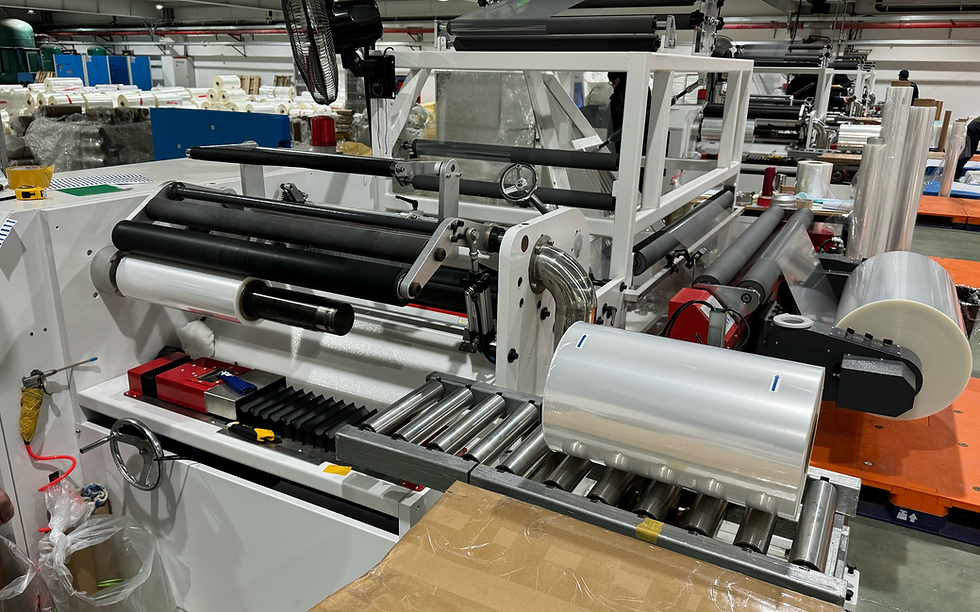How to Improve Post-Retort Softness and Retort Resistance in CPP Film?
- Amax Chemical

- Jun 30, 2025
- 4 min read

Retort pouches are the core solution for modern flexible food packaging, designed to withstand extreme heat, maintain excellent seal integrity, remain soft to the touch, and preserve a smooth appearance. Typically made from multi-layer structures such as PET, BOPA, AL, and CPP, the performance of the inner CPP (RCPP) layer directly determines the overall retort performance of the pouch.
In actual production, these pouches are required to endure sterilization processes at 121°C to 135°C for 30–60 minutes. Under such harsh conditions, conventional PP materials suffer from severe chain movement and secondary crystallization, leading to hardened films, brittleness, seal cracking, distortion, and pouch deformation—all of which negatively impact the product’s appearance and consumer experience.
As a result, careful selection and formulation of the RCPP core layer materials have become critical for improving high-temperature retort pouch performance. In this article, we provide a comprehensive analysis of the mechanisms, challenges, and optimized material solutions for high-temperature retort applications, validated by Amax’s practical customer cases to help clients achieve superior retort packaging design.
Performance Requirements for CPP Materials in Retort Pouches
Heat Resistance: Withstand retort at 121°C–135°C for 30–60 min without blistering, whitening, or pouch failure
Post-Retort Softness: Maintain excellent softness and hand-feel after retort to prevent brittle films and seal cracking
Low Shrinkage: Minimal dimensional change during retort to ensure stable pouch shape
Strong Lamination Bonding: Excellent adhesion to PA, PET, AL, and other layers to prevent delamination during retort
High Transparency (for RCPP): Preserve clarity for attractive product display
Mechanisms and Solutions to Improve Post-Retort Softness
1) Problems with Conventional PP Materials
Traditional homopolymer or random copolymer PP often crystallizes further during retort, causing films to harden and lose flexibility. This results in poor softness, wrinkling, brittle seals, and pouch breakage.
2) Amax Solutions: Ternary Copolymer or Block Copolymer PP — Solving Post-Retort Brittleness
• C200F (Ternary Copolymer PP)
Contains ~50% rubber content, balancing heat resistance and softness. Effectively reduces secondary crystallization, ensuring superior softness and flexibility after retort and minimizing breakage risks.
• C290F (Ternary Copolymer PP, Non-Phthalate C200F)
Similar to C200F in structure and performance but phthalate-free, ideal for premium retort pouches requiring superior softness and compliance with stricter environmental standards.
• PC480A (Block Copolymer PP)
High melting point (160°C), suitable for ultra-high temperature (135°C) retort applications. Retains transparency, softness, and dimensional stability even after prolonged high-temperature processing.
• CF309 (Block Copolymer PP, High Transparency)
Designed for demanding 135°C retort packaging with excellent softness, heat resistance, and optical clarity. Ensures smooth processing and maintains attractive pouch appearance.
3)Comparative Material Properties
Grade | Structure | Density (g/cm³) | Melting Point (°C) | Vicat Softening Point (°C) | Flexural Modulus (MPa) | Hardness (D/R) | Post-Retort Softness |
C200F | Ternary Copolymer PP (50% rubber) | 0.890 | 142 | 80 | 200 | 40D | ★★★★★ |
C290F | Ternary Copolymer PP (Phthalate-free C200F) | 0.880 | 142 | 80 | 200 | 38D | ★★★★☆ |
PC480A | Block Copolymer PP (High Ethylene) | 0.990 | 160 | 82 | 960 | 54R | ★★★★★ |
CF309 | Block Copolymer PP (High Transparency) | 0.991 | 160 | 103 | 981 | 63R | ★★★★☆ |
Why Choose Ternary Copolymer and Block Copolymer PP for Retort CPP Film?
1.Superior Post-Retort Softness to Prevent Brittleness
Conventional random copolymer PP becomes stiff and brittle after exposure to 121°C+ retort conditions due to increased crystallinity, causing poor hand-feel, cracked seals, and potential pouch failure.
Ternary copolymers disrupt polymer chain regularity with a third comonomer (e.g., ethylene or butene), lowering crystallinity and preserving softness after retort for durable and reliable packaging.
2.Outstanding Heat Deformation Resistance
Block copolymers contain rubbery segments that relieve thermal stress at high temperatures (135°C+), preventing shrinkage, whitening, and wrinkling while maintaining shape and seal integrity.
3.Control of Secondary Crystallization During Retort
While CPP film has low initial crystallinity post-casting, retort heat can induce further crystallization. High-crystallinity materials (like traditional PP) risk hardening after retort.Amax’s selected grades resist secondary crystallization, maintaining a consistently soft and flexible film structure.
4.Excellent Transparency After Retort
For products like eggs, meats, or ready-to-eat foods requiring clear visibility, Amax’s PP materials stay transparent without whitening after retort, enhancing product shelf appeal.

Verified Customer Cases: Amax Materials in Action
Case 1: C200F in 121°C Retort CPP Film
A client faced film hardening and pouch breakage after 121°C retort, which led to reduced post-retort flexibility and decreased production yield.By replacing 10% of conventional copolymer PP with C200F, post-retort flexibility improved significantly, sealing strength and deformation resistance were enhanced.
Result: Retort pouch breakage rate dropped from 20% to 5%, ensuring safer and more reliable packaging for ready-to-eat foods such as marinated eggs and braised snacks.
Case 2: PC480A in 135°C Retort CPP Film
A customer developing 135°C retort packaging experienced film whitening and deformation issues. Amax recommended PC480A as the core material.
Result: After 30 minutes of 135°C retort, the film retained excellent appearance, transparency, and softness with no whitening or wrinkling, meeting the high demands of premium egg and meat packaging.
⸻
Why Choose Amax’s Retort CPP Film Solutions?
At Amax, we go beyond supplying materials—we provide complete packaging solutions tailored to your retort needs:
• Custom Material Recommendations:
C200F, C290F, PC480A, and CF309 precisely meet the full range of retort requirements from 121°C to 135°C—ensuring optimal performance for every application.
• Problem Solving:
Eliminating traditional random copolymer PP’s issues of post-retort brittleness, whitening, and seal failure—delivering superior film softness, sealing strength, and post-retort clarity.
• Meeting Higher Standards:
From transparency to non-phthalate environmental compliance, from ready-to-eat snacks to export-grade meat packaging—Amax materials are field-proven and reliable.
• Customer Success Stories:
Leading food packaging companies using Amax solutions have reduced breakage rates by over 75%, while improving pouch appeareance, softness, and clarity—helping clients enhance product appeal and consumer trust.
With Amax, you’re not just choosing materials—you’re choosing a proven, integrated retort film solution.
We don’t just sell. We serve.
For more details on Amax’s CPP retort film mate
rials, contact us today and make your packaging safer, better, and more trustworthy.



